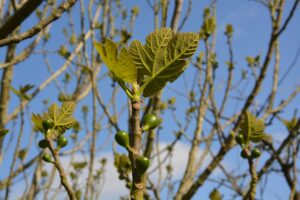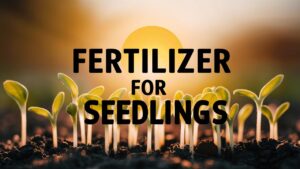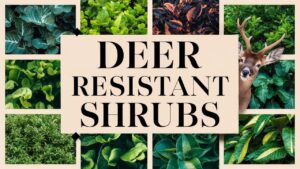In this guide, we’ll break down the essentials of fertilizing these splendid trees and provide you with insights to make an informed decision that best meets the needs of your evergreens.
Fertilizer For Evergreen Trees
| Image | Name | Rating | Shop |
|---|---|---|---|
 | SimplyGro Fertilizer Spikes |  | |
 | Tree & Shrub Plant Food Spikes |  | |
 | Evergreen-tone |  |
SimplyGro Fertilizer Spikes
If you’re looking for the best fertilizer for your evergreen trees and shrubs, consider the SimplyGro Fertilizer Spikes. With its specially formulated 12-3-3 formula (containing 12% Nitrogen; 3% Phosphorus; and 3% Potassium), this product was designed to meet the unique needs of these types of plants.
This set-it-and-forget solution provides a continuous feed for up to three months, which is great for maintaining lush leaves, vibrant colors, and bountiful growth. The fertilizer spikes are also pre-measured, reducing the risk of overfeeding your plants and minimizing nutrient loss. Plus, with the patented TruSpikes design, application is hassle-free – simply hammer them in place without worrying about breakage or leakage issues.
Tree & Shrub Plant Food Spikes
A good fertilizer for evergreen trees can help promote healthy growth and vibrant foliage. Based on customer reviews and ratings, I would recommend the Miracle-Gro Tree and Shrub Plant Food Spikes for this purpose.
This product is specifically designed for use with deciduous, flowering, and evergreen trees, making it a versatile option for various types of landscapes. The easy-to-use spikes provide nutrition directly to the roots of your trees, promoting healthy growth. Simply apply one spike around each tree’s drip line in spring and fall, spacing them at least three feet apart, and you’re good to go. This 12-pack is enough to feed three smaller trees or one larger one, making it a great value for most homeowner needs.
Evergreen-tone
The Espoma Organic Evergreen-Tone fertilizer is an excellent choice for promoting optimum growth and health in your evergreen trees and shrubs. With a balanced 4-3-4 N-P-K ratio, this product provides all the necessary nutrients for healthy development. It’s also environmentally safe and free of toxic sludges or ingredients, making it perfect for organic gardening enthusiasts.
What sets Evergreen-Tone apart is its unique blend of natural and organic ingredients, enhanced with Espoma’s exclusive Bio-tone formula. This means that your evergreens will receive a rich dose of nutrients at planting time or during established plant feeding sessions. Whether you’re using it for pine, fir, or any other type of evergreen tree or shrub, this fertilizer has been approved as a registered Organic Input Material, meeting all requirements for organic gardening production. It’s a reliable and effective choice backed by the Espoma Company’s expertise since 1929.
BioAdvanced Tree & Shrub Protect and Feed
BioAdvanced 12 Month Tree and Shrub Protect and Feed is a popular choice among gardeners looking to keep their evergreen trees healthy and pest-free. This granular product offers year-round protection against insects like Japanese Beetles, Emerald Ash Borers, and aphids.
The slow-release fertilizer in BioAdvanced Tree and Shrub Protect and Feed promotes the overall health of your trees and shrubs, nourishing them from roots to leaves with a single application. With its easy-to-use granules, you can tackle your lawn care tasks without spending all day spraying or watering – perfect for keeping your outdoor space looking great.
Evergreen Fertilizer
If you’re looking to give your evergreen trees a boost, consider using TPS NUTRIENTS Evergreen Tree Fertilizer. This liquid plant food is specifically designed for all conifer trees and shrubs, making it a versatile solution for gardeners with varied collections of evergreen species.
This fertilizer helps promote healthy growth in your evergreens by providing essential nutrients like nitrogen, phosphorus, and potassium that support photosynthesis and root development. The 8 oz (250mL) size is compact enough to fit into small gardening spaces or travel bags for on-the-go nutrient boosts. Overall, TPS NUTRIENTS Evergreen Tree Fertilizer seems like a great choice for those looking to keep their evergreens thriving year-round.
Arborvitae Fertilizer
The TPS NUTRIENTS Arborvitae Tree Fertilizer is a great option when it comes to choosing a product to promote healthy growth and lush foliage on evergreen trees and shrubs. It’s an easy-to-use liquid fertilizer that can be mixed with water in just a few steps, making it perfect for those looking for a hassle-free plant care solution.
This arborvitae tree fertilizer is particularly useful because it provides essential nutrients like nitrogen and potassium to support strong root systems and healthy growth. Whether you’re dealing with specific varieties of arborvitaes or other evergreen shrubs, this product has been designed to address growth issues and promote steady development.
Evergreen Fertilizer Spikes
This product, Jobe’s Slow Release Evergreen Fertilizer Spikes, is a great option for those looking to nourish their evergreen trees. The spikes are designed specifically for acid-loving trees like cypress, arborvitae, pine, and cedar, and come in convenient 9-count packs. The formula features a balanced blend of nutrients with an NPK ratio of 11-3-4, which provides a continuous supply of vital nutrients to the tree’s roots.
The benefits of using Jobe’s Slow Release Evergreen Fertilizer Spikes are numerous. They prevent wasteful runoff and mess, eliminating potential hazards and unpleasant odors. The spikes also come pre-measured to ensure the right amount of fertilizer is applied, removing the risk of over-fertilizing. Simply apply the spikes twice a year in early spring and late fall for optimal results, allowing your evergreen trees to thrive with lush foliage and vibrant color all season long.
How To Choose a Fertilizer For Evergreen Trees
Evergreen trees are a marvelous addition to any landscape, offering year-round greenery and creating a natural backdrop for your outdoor spaces. However, just like any other plant, they require proper care and nutrition to thrive. One of the most critical aspects of this care is selecting the right fertilizer. If you’ve ever found yourself scratching your head in confusion at the garden center while staring at shelves lined with fertilizers, you’re not alone. Choosing the right fertilizer for evergreen trees can feel daunting, but it doesn’t have to be.
Understanding the Nutritional Needs of Evergreen Trees
Before diving into the specifics of fertilizers, it’s crucial to understand what nutrients evergreen trees require to thrive. Evergreens, unlike deciduous trees that lose their leaves in the fall, maintain their foliage throughout the year, which means they must continuously utilize nutrients. Primary nutrients necessary for healthy evergreen growth include:
Nitrogen (N): Essential for foliage growth and overall vitality, nitrogen is particularly important for the development of lush, green leaves. It promotes the synthesis of chlorophyll, the green pigment responsible for photosynthesis.
Phosphorus (P): Vital for root development and flowering, phosphorus aids in energy transfer within the tree. While evergreens may not flower like deciduous trees, phosphorus plays a critical role in overall plant health, enhancing root establishment.
Potassium (K): This nutrient helps in the regulation of various physiological functions, from water uptake to overall growth and resilience against diseases.
Additionally, evergreens may require secondary nutrients, such as calcium, magnesium, and sulfur, as well as micronutrients like iron and manganese. Regularly monitoring soil health is essential to ensure your trees receive the full range of nutrients they require.
Assessing Soil Conditions
The first step in choosing the right fertilizer for your evergreen trees is assessing your soil conditions. Soil quality can significantly affect how much and which nutrients your trees can absorb. Here are some steps to help you evaluate your soil:
Conduct a Soil Test
A soil test is an invaluable tool that provides insight into the nutrient composition and pH of your soil. You can either purchase a home testing kit or send a sample to a local extension service for a more detailed analysis. The results will inform you of any nutrient deficiencies or imbalances.
Understand Soil pH
Evergreen trees typically prefer slightly acidic to neutral soil, with a pH ranging from 5.5 to 7.0. If your soil is too alkaline, certain nutrients may become unavailable to plants, which can lead to deficiencies. If issues with pH arise, consider adding amendments to bring your soil back to optimal levels.
Assess Soil Texture and Drainage
Soil texture refers to the size of soil particles and influences drainage and nutrient retention. Sandy soils, for instance, drain quickly but may not hold onto nutrients, while clay soils retain moisture but can become compacted. Evergreens thrive in well-draining soil, so evaluate the drainage capabilities of your soil when selecting a fertilizer.
Types of Fertilizers Available
Once you have a clearer understanding of your soil conditions and nutritional needs, it’s time to explore the different types of fertilizers available for evergreens. They generally fall into two categories: synthetic and organic.
Synthetic Fertilizers
Synthetic fertilizers are manufactured chemical compounds designed to provide nutrients in a readily available form. Some benefits include:
Quick Release: Synthetic fertilizers act rapidly, delivering nutrients to your trees almost immediately.
Precise Nutrient Ratios: They come in various formulations, allowing you to tailor the nutrient ratios to the specific needs of your trees.
Common types of synthetic fertilizers for evergreens include:
Granular Fertilizers: Often slow-release, these can provide a steady supply of nutrients over time.
Liquid Fertilizers: Useful for quick applications, especially during the growing season, but may require more frequent applications.
However, it’s important to exercise caution with synthetic fertilizers, as over-fertilizing can lead to nutrient runoff and environmental issues.
Organic Fertilizers
For those looking for a more natural approach, organic fertilizers are derived from plant or animal matter. Some advantages include:
Soil Health: Organic fertilizers improve soil structure and increase microbial activity, fostering a healthier environment for root development.
Sustainable: They are generally more environmentally friendly and can enhance the long-term health of your garden.
Common organic fertilizers include:
Compost: An excellent source of a broad range of nutrients, compost improves soil structure and fertility.
Fish Emulsion: Rich in nitrogen and other trace elements, fish emulsion is an effective organic option to support growth.
Bone Meal: High in phosphorus, this is especially beneficial when planting new evergreens.
When using organic fertilizers, it may take longer to see results compared to synthetic options, but the long-term benefits can vastly outweigh the delay.
Choosing the Right Fertilizer Ratio
When examining fertilizers, you’ll often see a series of three numbers on the packaging—these represent the N-P-K ratio, indicating the percentages of nitrogen, phosphorus, and potassium. For evergreen trees, a balanced ratio or one with higher nitrogen can be beneficial. Here are some common ratios suitable for evergreens:
10-10-10: A balanced fertilizer that provides an equal proportion of all three nutrients, appropriate for general use.
12-4-8: A higher nitrogen fertilizer that encourages foliar growth, ideal for establishing evergreens.
Choosing the right N-P-K ratio is contingent upon the specific needs of your trees and the results from your soil test. Always follow the recommendations based on the health of your trees and soil.
Timing Your Fertilization
Timing can significantly influence the effectiveness of your fertilization efforts. For evergreen trees, the best time to fertilize is typically in early spring, just before the growing season kicks off, but a second application in late summer can also be beneficial. Here’s a breakdown of the best practices for fertilizing evergreens:
Early Spring Fertilization
As the trees begin their active growth phase, applying fertilizer in early spring gives them the necessary nutrients to start strong. This application will support new growth, including foliage development and root expansion.
Late Summer Fertilization
A second application in late summer can provide a nutrient boost that helps the trees prepare for winter. This is especially crucial for evergreens, as it can enhance their resilience during colder months.
Avoid Late Fall Fertilization
Fertilizing too late in the year can stimulate new growth that is susceptible to frost damage. It’s essential to stop fertilizing at least a month before the expected first frost in your area.
Application Methods
How you apply fertilizer can be just as important as the type you choose. Different application methods suit various types of fertilizers and planting situations.
Granular Fertilizers
When using granular fertilizers, apply it in a broadcast pattern around the drip line—the outermost area where rain drips off the branches. Be careful not to let it touch the trunk, as this can harm the tree. Water thoroughly after application to help the nutrients penetrate the soil.
Liquid Fertilizers
Liquid fertilizers can be applied using a sprayer or watering can. These are particularly useful for targeted applications or for evergreens in containers, as it’s easier to control the dosage and minimize waste. Liquid fertilizers often work best when applied to moist soil.
Foliar Feeding
Another option is foliar feeding, where a nutrient solution is sprayed directly onto the leaves. This method is effective for quickly addressing nutrient deficiencies, as leaves can absorb some nutrients directly, but it shouldn’t replace soil fertilization.
Considerations for Container-Grown Evergreens
If you’re growing evergreen trees in pots or containers, they can have unique fertilization needs compared to those planted in the ground. Container soils often lose nutrients more quickly, so regular fertilization is key. Here are some tips tailored for container-grown evergreens:
Use Slow-Release Fertilizers
Opt for slow-release fertilizers to provide consistent nutrition over time. This method reduces the risk of over-fertilization, which is common in small containers.
Monitor Moisture Levels
Container-grown plants can dry out faster, especially in the growing season. Ensure that your trees are well-watered after fertilization, as this will aid nutrient uptake.
Frequency of Application
You may need to fertilize container-grown evergreens more frequently than those in the ground. Monitor their health and adjust your fertilization schedule accordingly, often applying every 4-6 weeks during the growing season.
Addressing Common Evergreen Issues
Even with proper fertilization, evergreen trees can face a range of issues. Being aware of common problems can help you address any nutrient deficiencies or health issues promptly.
Yellowing Foliage
Yellowing leaves can indicate nitrogen deficiency or poor drainage. If you notice this issue, consider altering your soil or adjusting your fertilization strategy. A quick soil test can help pinpoint the issue.
Needle Drop
Needle drop can occur due to environmental stress or improper fertilization. Ensure that your evergreens have adequate hydration and that they’re not being over-fertilized, which can lead to burnt roots.
Pest Infestations
Healthy trees are more resilient to pests, but if you notice an infestation despite good care, consult with a local extension service to determine the best course of action.
Conclusion
Choosing the right fertilizer for evergreen trees doesn’t have to be an overwhelming task. By understanding the nutritional needs of your trees, assessing soil conditions, and selecting the right type and ratio of fertilizer, you can provide the nourishment these beautiful trees require to thrive.









